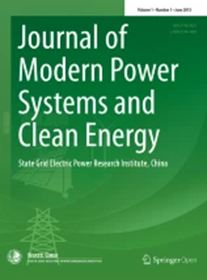Deep-Learning-Based Short-Term Voltage Stability Assessment with Topology-Adaptive Voltage Dynamic Feature and Domain Transfer
IF 6.1
1区 工程技术
Q1 ENGINEERING, ELECTRICAL & ELECTRONIC
Journal of Modern Power Systems and Clean Energy
Pub Date : 2025-01-30
DOI:10.35833/MPCE.2024.000507
引用次数: 0
Abstract
Short-term voltage stability (STVS) assessment is a critical monitoring technology in modern power systems. During daily operations, transmission lines may switch on or off due to scheduled maintenance or unexpected faults, which poses challenges to the STVS assessment under varying topology change conditions. To adapt the STVS assessment to the system topology changes, we propose a deep-learning-based STVS assessment model with the topology-adaptive voltage dynamic feature and the fine-tuning domain transfer for power systems with changing system topologies. The topology-adaptive voltage dynamic feature, extracted from streaming time-series data of phasor measurement units (PMUs), is used to characterize transient voltage stability. The voltage dynamic features depend on the balance of reactive power flow and system topology, effectively revealing both spatiotemporal patterns of post-disturbance system dynamics. The simulation results based on large disturbances in the New England 39-bus power system demonstrate that the proposed model achieves superior STVS assessment performance, with an accuracy of 99.65% in predicting voltage stability compared with the existing deep learning methods. The proposed model also performs well when applied to the larger IEEE 145-bus power system. The fine-tuning domain transfer of the proposed model adapts very well to system topology changes in power systems. It achieves an accuracy of 99.50% in predicting the STVS for the New England 39-bus power system with the transmission line alternation. Further-more, the proposed model demonstrates strong robustness to noisy and missing data.基于拓扑自适应电压动态特征和域转移的深度学习短期电压稳定性评估
电压短期稳定性评估是现代电力系统的一项关键监测技术。在日常运行中,输电线路可能会因定期维护或意外故障而开断,这给各种拓扑变化条件下的STVS评估带来了挑战。为了使STVS评估适应系统拓扑变化,提出了一种基于深度学习的STVS评估模型,该模型具有拓扑自适应电压动态特性和微调域转移,适用于拓扑变化的电力系统。从相量测量单元(pmu)的流时间序列数据中提取拓扑自适应电压动态特征,用于表征暂态电压稳定性。电压动态特征依赖于无功潮流平衡和系统拓扑结构,有效地揭示了扰动后系统动态的时空格局。基于大扰动的新英格兰39母线电力系统仿真结果表明,与现有的深度学习方法相比,所提出的模型在电压稳定性预测方面具有较好的STVS评估性能,预测准确率达到99.65%。该模型也适用于更大的IEEE 145总线电力系统。该模型的微调域转移能很好地适应电力系统拓扑结构的变化。对新英格兰39母线交替输电系统的STVS进行预测,准确率达到99.50%。此外,该模型对噪声和缺失数据具有较强的鲁棒性。
本文章由计算机程序翻译,如有差异,请以英文原文为准。
求助全文
约1分钟内获得全文
求助全文
来源期刊

Journal of Modern Power Systems and Clean Energy
ENGINEERING, ELECTRICAL & ELECTRONIC-
CiteScore
12.30
自引率
14.30%
发文量
97
审稿时长
13 weeks
期刊介绍:
Journal of Modern Power Systems and Clean Energy (MPCE), commencing from June, 2013, is a newly established, peer-reviewed and quarterly published journal in English. It is the first international power engineering journal originated in mainland China. MPCE publishes original papers, short letters and review articles in the field of modern power systems with focus on smart grid technology and renewable energy integration, etc.
 求助内容:
求助内容: 应助结果提醒方式:
应助结果提醒方式:


